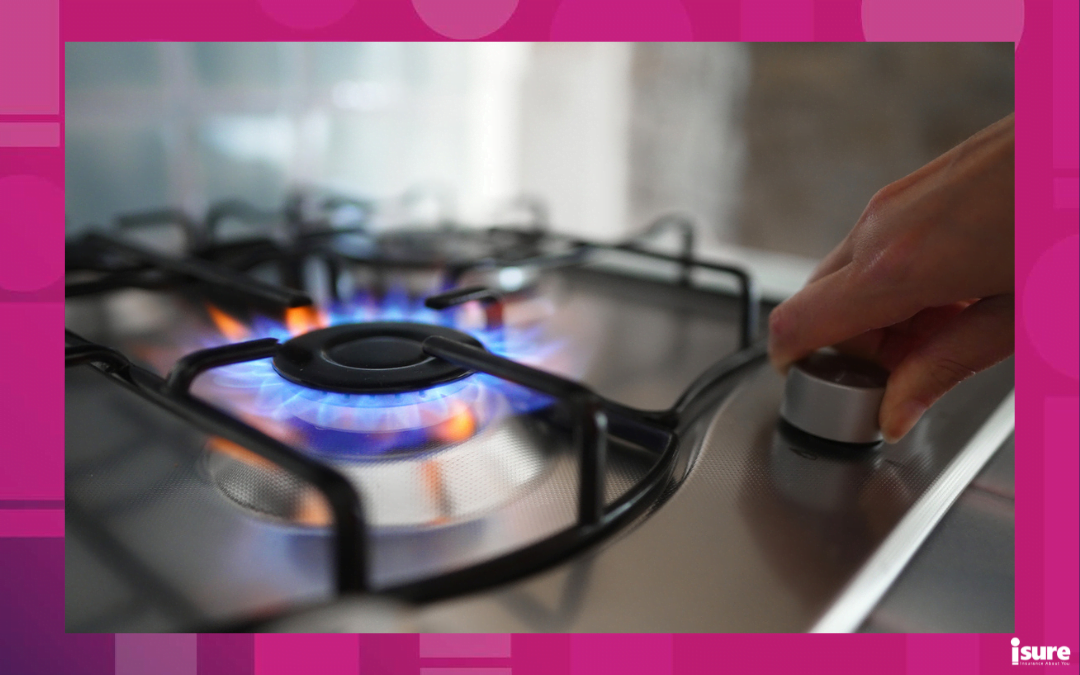In today’s day in age, natural gas is a popular alternative to electric when it comes to fueling your home. It is a clean, efficient source of fuel that isn’t too costly. Additionally, natural gas is a safe and efficient energy source, from gas-powered fireplaces and on-demand water heaters to clothing dryers and gas stoves. That said, it is extremely important to ensure you are operating your gas appliances with safety and caution. If used irresponsibly, natural gas can go from safe to dangerous very quickly. Luckily, isure is here with seven gas safety tips for your home below.
1. Never leave natural gas appliances running
When your natural gas appliance, such as a stove or fireplace is on, it is super important to never leave it unattended. Nowadays, many stoves, barbecues and other appliances have been made safer than in the past. However, it is crucial to never leave your natural gas appliance on while you sleep or leave the house. This can lead to a very dangerous situation, as gas can fill your home. This is also one of the most common reasons that kitchen fires start. Or worse, a possible explosion.
2. If you smell gas, evacuate immediately!
Natural gas is odourless, but a smell similar to rotten eggs is added so it will be noticed fairly quickly. If you smell this or can hear the hissing sound of escaping gas, it is important to get outside immediately. Call 911 or your utility provider, depending on the severity of the situation. It is also crucial to make sure you do not smoke, use your landline or operate any electrical switches while natural gas is present. Once outside, make sure you leave your doors and windows open so that you can let the gas escape. This is our most important gas safety tip!
3. Regularly maintain your natural gas appliances and have them inspected
By having your appliances maintained on a regular basis, you will be ensuring they are always operating safely and efficiently. It’s important to make sure that when you are having your appliances serviced, it is done by a licensed natural gas contractor. If you need help finding one, you can contact your natural gas provider (like Enbridge) and request a list of licensed natural gas contractors within your city or province.
4. Install a carbon monoxide detector in your home
Carbon monoxide is a serious danger, especially when it lets loose in your home. Because carbon monoxide is invisible and odourless, it can cause a real threat to you and your family’s safety. This is why it is crucial to have carbon monoxide detectors installed in your home and checked regularly. These look fairly similar to smoke alarms, and should be installed near your bedroom so that you can hear it when you are asleep if it goes off. If you’d like to learn more about carbon monoxide detectors and the importance of them, check out “Why are fire alarms and carbon monoxide detectors important?”
5. Know where your natural gas shut-off valve is
Before an emergency occurs, you can stop it by shutting off your gas immediately. This is why it is so important to know where the main natural gas shut-off valve is located in your home. Furthermore, you should be informed on how to properly use it. Many older gas shut-off valves require a screw driver or wrench in order for it to be properly shut-off. If you are not taught how to properly use your shut-off valve, teach yourself immediately.
6. Keep your natural gas fireplace clean and free from obstructions
Natural gas fireplaces are a super appealing and comfortable way to heat a room without hassle. However, it is important to use these safely! Make sure to keep children, pets and combustibles out of reach from the fireplace or any hot surfaces. Many safety screens and fire-resistant guards are available to effectively prevent accidents. On top of this, it will make sure your fireplace remains clean without any obstructions.
7. Turn off gas when appliances are not being used
If you find an appliance will not be used for a prolonged period of time, it is important to make sure you shut it off in order to play it safe! A good example of this is your BBQ during the winter months. Shutting the gas off either on the tank itself or via your natural gas shut-off valve will prevent freezing in the winter months. If you find your gas fireplace isn’t used for six months of the year, turning off the gas is also a great way to keep you and your family safe.
Remember, natural gas is an incredible way to keep your home running efficiently and smoothly, but only if used safely and correctly. We hope our gas safety tips have helped make it more clear! If you are in the market for a new home and would like to learn more about insurance and natural-gas appliances, why not give us a call? We have knowledgeable brokers who are available to help with whatever questions you have! Request a quote or contact us today!



